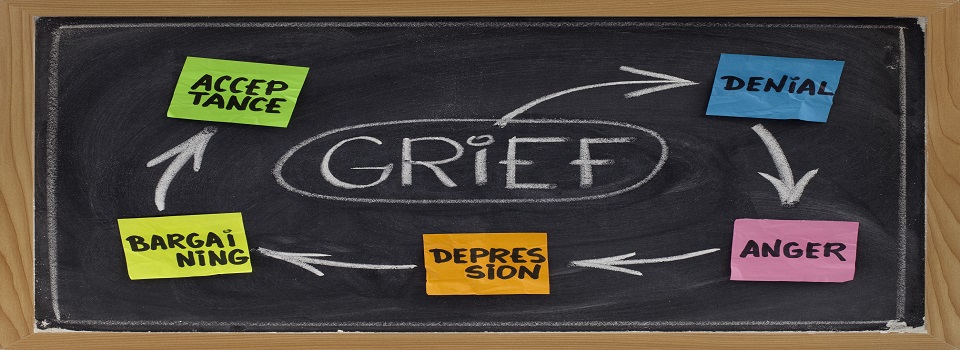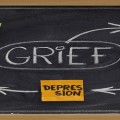
To date, the search words that bring the most visitors to our blog are centered around the Stages of Grief specifically those following a suicide. Every time I see those search terms, I cringe a little. For a couple reasons. One, it saddens me that there are so many people searching for the answer to when their pain will end. Two, because as a society we have given people this notion that grief not only HAS stages, but it has a specified end. As a counselor myself, one would think that these stages would be somewhat of a “Grief Bible” to me. At one point I guess I thought that we all grieve in a similar manner, reaching various “stages” when we are ready. Then my Dad died by suicide, and that belief quickly diminished.
Here are some of my problems with the Stages of Grief, and why honestly, I think they are outdated and overrated.
1.) They imply that the grief process is brief and predictable. If there is one thing I have learned from the loss of my father is that there is NO predicting what will come next. You can’t control what others say to you, and you certainly can’t control the way society responds following a suicide. Additionally, there is no such things as brief when it comes to grief. In fact, I don’t think my grief journey will ever truly end. There will always be something that triggers me, and always be a memory that reminds me that my dad is no longer here. It is not necessarily that I have “accepted” his death; I have just learned to live with it.
2.) They suggest that all grief is the same and all journeys are the same. I have not met another survivor who has the same story as mine. Sure we all share feelings and thoughts but my grief is just that; its MINE. For anyone to believe that their grief will follow the same path as another, sets us up for heartache and can give us hope that it will be easier than it actually will. Hope is a beautiful thing, but managing our own expectations is equally important. We can’t expect to know what tomorrow will bring. The Stages to me, elicit a belief that we can determine what comes next, and when that doesn’t happen we are left feeling alone and hopeless.
3.) They make you feel as if something is wrong with you if you haven’t reached the final stage, Acceptance. So what exactly does acceptance look like? I feel that we can all answer this differently. Acceptance to me may mean one thing, while its meaning completely different to another. There is also no time limit on when we reach acceptance, and I do not believe it comes after a specific stage. It comes when we are ready to not accept, but forgive ourselves and the person we lost to suicide.
4.) They lead you to believe that all pain, hurt, and sorrow will disappear when you “accept” what has happened. One of my biggest problems with the stages is they do not acknowledge that you will continue to feel pain, hurt and sorrow. These feelings are all a part of life. I feel extreme pain in my heart when I look at my beautiful daughter and remember that she will never meet her grandfather. It often brings tears to my eyes, or leads to a short session of overwhelming tears that seem to never stop coming. Does this mean I haven’t reached acceptance? No, it means I am a human who has experienced great loss.
I will say that the Stages of Grief can be helpful as long as we see them for what they are. A means to describe some of the chaos we are experiencing. But to assume that you will move through one stage to another, without bumps or detours, in any set amount of time is simply unrealistic. Do not let others define how you feel, what you should feel and when you should feel it. Life just doesn’t work like that. At the end of the day, this is YOUR story and YOUR experience. Honor yourself by doing what you need to do to heal and find your own form of acceptance.




I agree with you we all have a story when it comes to dealing with grief. It’s been almost 4 months since my grandson took his life at 20 years of age. All the books that I’ve read have not helped much…they were not my feeling , not this heavy pressure on my heart that seems to stop my breathing at times.
I have no idea how to accept this or to stop feeling like I should have been able to save him.
I am so sorry that you lost your grandson. I think the first few months are often the hardest as we try and conceptualize the magnitude what just occurred. I don’t think I will ever “accept” that my father died by suicide. And that’s ok! I am however able to acknowledge that it has occurred but it does take time. Just know that you are not alone!
I know when I have a dry spell (no crying for a few days or weeks even) that there is a day coming when all I do is cry. Well today is that day!! Miss you Dad so much. Thanks for sharing.
Thank you for this article. It sums up very well my own feelings about my grief journey. I have little patience with people who subscribe to a sort of “follow these ten steps (or how ever many steps) and then everything will be OK” philosophy on grief and loss. Everyone’s journey is unique, even if they encompass many of the same feelings. And I don’t believe grief ever ends. My fiancee took his life almost two years ago; I’ve gotten well beyond the days when it took every ounce of strength and willpower I had to get out of bed everyday – yet, I still feel periodic waves of profound sadness, grief or traumatic anxiety. And I don’t expect to ever completely get past that.
I am so happy that you relate and that this article was helpful for you. I get so frustrated when I see others feeling as if something is wrong with them because they still cry and still feel sadness. We have created a world that frowns about pain! Pain is so normal and a part of life. I too believe the grief process is ongoing. Overwhelming emotions will come and go as we are reminded that our loved ones are no longer with us. We are only human!
This is so true and it makes me cross too to think that people wonder what stage you are at i.e “have I accepted yet that my son has died”. Its been over 3 years and I certainly haven’t accepted it….don’t know if I ever will. Still expect him to walk in the door. It still hurts just as much as when it first happened…. I just hide the pain from others and live with it behind a mask, so I am bearable to be with. I am not depressed, I am grieving. Because I love my son eternally, I have no doubt that I will hurt as long as I live. Thank you for bringing this subject to others attention, I immediately forgive people for the insensitive and stupid things they say because they don’t understand fully unless they experience it and I certainly don’t wish the pain on anyone..
It always fascinates me that people use the stages of grief as a map for grief. The stages of grief were initially designed as a map for those who were terminally ill. I am not sure when society shifted the stages to post death. I agree…I don’t know if everyone will ever truly accept that this has happened. I like using the word acknowledge. We are able to acknowledge that the death occurred but may not accept it. Acceptance is not something to strive for. It is a moving target. You are right Brigitte; you are grieving and likely always will. There is nothing wrong with that.